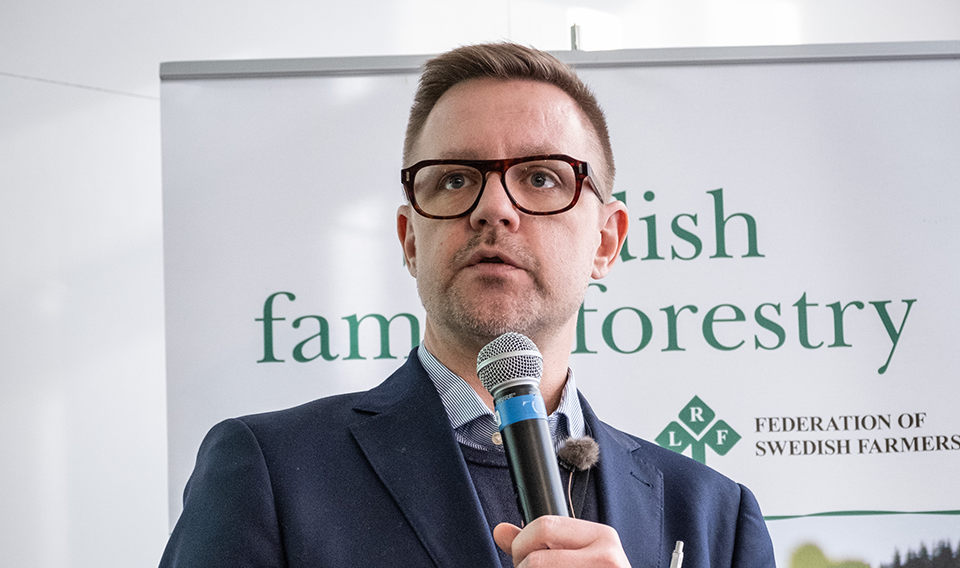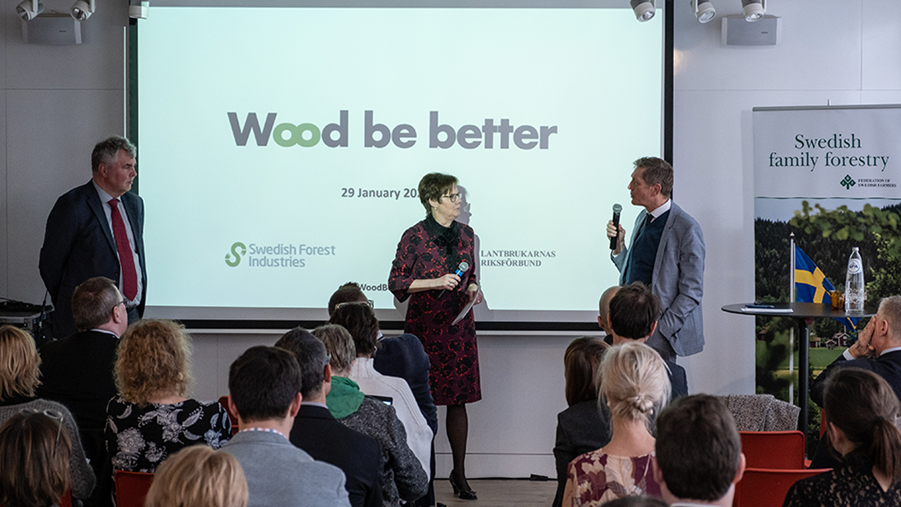
Interviews from Wood be better
We interviewd people, susch as Fredrik Federly, Jessica Polfjärd and Piotr Borkowski visiting the network. Hear what they had to say.

The Swedish forest sector has launched a Brussels-based network called "Wood be better". Its aim is to create a space to increase understanding of the forest-based value chain and to discuss it's role of this value chain in EU policy. At its first meeting on 29 January 2020, hosted by MEP Fredrick Federley (Renew Europe), the focus was on the role of forests, forestry and forest products in the transition to a climate neutral economy.
"Forests and forest products are part of an array of solutions to decarbonise the European economy," said Artur Runge-Metzger, a director for climate at the European Commission. Forests play a role across many policy areas, including: energy efficiency (insulation), renewable energy (fuel), industry (feedstock), agriculture (land management), biodiversity and carbon storage (sinks), of course.
"The forestry sector can for example produce textiles that last longer and can be recycled, and hence create a new industry in Europe," said MEP Fredrick Federley. A new EU forestry strategy is currently being discussed.
So far however, the role of forests in climate policy has been limited. They are recognised as a valuable carbon sink and regulated as such by laws on land use, land use change and forestry (LULUCF). For Peter Holmgren, founder of FutureVistas, a Swedish consultancy, "a forest is a fantastic instrument for dealing with climate change." He argues that the potential climate impact of forests must include the effect of forest-based products replacing fossil-based products, or substitution. Holmgren recalled that this concept is not new: the International Panel on Climate Change (IPCC) already mentioned it in its first assessment report in 1990.
Holmgren's report on 'the contribution of the Swedish forestry sector to global climate efforts' demonstrates that Sweden is already almost climate neutral if you take account the substitution effect.
Swedish forests as a carbon sink retain 55 MtCO2e/year. Fossil fuel reduction through substitution has been calculated for three main categories of product - wood, pulp and paper, and energy - and adds up to another 42 MtCO2e/year. Greenhouse gas emissions in the forest sector's value chains are calculated at 4 MtCO2e/year. The total is therefore a net climate saving of roughly 93 MtCO2e/year. All Swedish consumption is estimated to account for 100 MtCO2e/year.
Holmgren is currently working to assess the substitution potential for the whole EU and his preliminary results show that it is "very high". Final results should be available in about a month.
Substitution is already on the radar of the European Commission through its emphasis on the need for a European bioeconomy, Runge-Metzger said. Forest-based feedstocks have great potential, he added. So far, the chemical industry uses 10% of all Europe's oil imports. "But you can also get carbon atoms from agriculture or forests," the EU official noted.
One of the parameters to consider however, is the carbon price. "This is an incentive to valorise different feedstocks and the contribution of the forest-based sector, and raise the competitive advantage of forestry," Runge-Metzger said. It is an incentive for sound forest management.
The result of 100 years of forest management in Sweden is a doubling of its carbon sink in parallel to a doubling of its harvest, Holmgren pointed out. "The permanence of the forest system is more important than the permanence of the growing stock," he summed up.
Other hot topics that participants would like to debate at future meet-ups of the 'Wood be better' network include: adaptation to climate change, misconceptions around deforestation and substitution opportunities in for example textiles and feedstock. There are three more meetings planned for 2020.
The "Wood be better" network is an initiative from the Swedish Forest Industry Federation and forest owners in the Federation of Swedish Farmers.
Storgatan 19
Stockholm
Ansvarig utgivare:
Jenny Spets Wojarski,
utsedd av Skogsindustrierna
Databasens namn:
Föreningen Skogsindustrierna,
www.skogsindustrierna.se
Box 55525
102 04 Stockholm
08-762 72 60